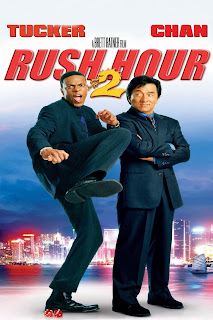End Of The Week Shorts #98
It has been a great many years since I've seen any Rush Hour film and this was something of a pleasant surprise. This finds comedy in low hanging fruit and has no reservations about this at all; all the basic racial stereotypes you can imagine are thrown into a hackneyed stew... yet it is often amusing enough. My funny bones have been fractured of late, so I didn't expect much in the way of laughs, nor in terms of sophistication, but Rush Hour 2 works well enough and I can't deny sniggering at "I will bitch slap you back to Hong Kong/Africa."
The level of action comedy is what is most surprising about Rush Hour 2. Somehow, Tucker convincingly holds in own in all the fight scenes - albeit inexplicably. Chan puts together some stellar choreography as always and all is executed with finesse. I often stay away from Chan's Hollywood films, but Rush Hour 2 is not terrible.
I cannot say I watch this in full (I'm not even sure if I watched the majority of it), but Eat Pray Love is... eh. The humanity at the base of this narrative is somewhat palpable; we are made to understand why our character constantly seeks transformation and the new. Robert's performance (in spite of the so-so script) really pushes this. However, there is a sheen placed over the entirety of this film that just feels icky. Maybe it's the honesty, maybe it's the naivety, the melodrama, the contrivance, the cultural learning, but Eat Pray Love is subtly off putting.
Pan's Labyrinth is a deeply fascinating film. I have never been too big a fan of Del Toro's work, but this always sat at the heart of his filmography as the work that intrigued me most. Re-watching this today, I saw Del Toro packing an awful lot of hefty, self-conscious, intellectual-symbolic discourse behind a facade of a fairy tale. I cannot make any concrete conclusions without pondering the film at greater length, but I do not feel as of now that Del Toro makes a complete film in Pan's Labyrinth - that he manages to say as much as his form and symbolism initially makes us believe. There is much to explore about innocence and a yearning to live about this narrative, however. So, I'll certainly have to make a quick return to Pan's Labyrinth soon.
Yeesh...
When half of your stand-up routine is telling the crowd that you used to be a real, dedicated stand-up comic, something has to be wrong. Ken Jeong is a ludicrous character - that seems to be why so many people love him in the Hangover series (But, did you die... ?? is indisputably hilarious, it must be said). However, he hasn't much of a real comedic presence. And we see this better than anything in You Complete Me, Ho. He has lived a nutty life and such is what he provides as comedy. However, whilst there is something somewhat amusing about him telling his stories, his translation of his experiences into something that is supposed to make you laugh is shoddy. This leaves his special uninspired and all too easy to criticise as a celebrity's mere foray onto the stand-up's stage.
I hold no shame when I say that the only reason I watched this movie was because of Madonna's "I'm Crazy For You," which somehow got stuck in my head recently.
Vision Quest feels like something of a cousin to 1983's Flashdance. Both are teen sports romances - pretty low-class ones at that. They rely heavily on generic trope and their soundtracks, and push political commentary about freedom and independence in the most clunky and cringe-inducing manner. Also, both can't help but fetishise urban work outs. But above all else, each film gets trapped in its own political commentary, manifesting itself as the oozing monster that it maybe means to defame. That is to say that, whilst Vision Quest is about a woman's independence and a boy's growth, it nonchalantly has a near rape scene and mention of a friend's sister letting a wrestling team have their go. The 80s are weird. Vision Quest doesn't work.
As infamously controversial as Irreversible is, if you can accept its amorality, you can very easily make an argument for this being a masterpiece. Sex and fate. Noe's themes. What is the significance of sex; what are the varying ways it can be of significance? It may be a source of heartbreak, pleasure, existential fulfilment and unfathomable violence. Incredibly human sex is--as a process, act and phenomena. Its meaning manages to stretch forward in time, manages to take possession of the future, and simultaneously disintegrate because it is so human. It is not sex itself that stretches and disintegrates, but the significance of the contact between two humans. Infinitely meaningful and meaningless this contact may be, and so moral and amoral Irreversible is. The dialectic, if one is able to brave it, is deeply affecting.
How is subjectivity created within a film? Akerman, like many realists, suggests that subjectivity emerges from the meeting of objectivity, patience and quotidian. She makes us wait, provides no psychological-emotional exposition; we watch a frail and skeletal syuzhet unfold, mired by the task of formulating a coherent fabula. Does Jeanne ever become more than an object on the screen? Can we understand her humanity? Are we to provide her it?
Melancholy as it is impenetrable, Jeanne Dielman is a film that shows us that routine is a mere illusion of stability and meaning. It is not how one makes their way through the day, but with what purpose, that makes the difference.
Previous post:
End Of The Week Shorts #97
Next post:
Gully Boy - Impressive
More from me:
amazon.com/author/danielslack
















